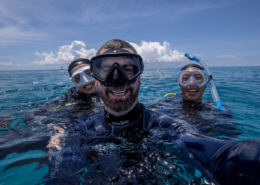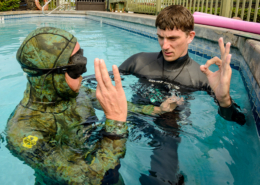Freediving At Any Age: Interviews with Competitive Freedivers Over the Age of 50
By Rachel Novak
Freediving is a sport that can be enjoyed by people of all ages. Not only does freediving give you the ability to connect with the ocean and other bodies of water, but it can teach you mindfulness, body awareness, and can connect you to an incredible community of like-minded people with common interests. We interviewed 4 competitive freedivers on the US National Team who are competing in the Masters category (freedivers over the age of 50) at the Confédération Mondiale Des Activités Subaquatiques (CMAS) Freediving Depth World Championships. Read on to hear their perspectives about aging and how it relates to freediving.
Meet the Athletes

Avi Kleyman is a 54 year-old who began his interest in underwater activities through scuba diving and underwater photography. He began freediving at the age of 50 when his friend invited him to take a freediving course based in LA and on Catalina Island. Initially, Avi was skeptical. “I thought that it would be a boring past time because you can’t stay underwater very long. You just go up and down on a line. What’s the fun? However, when I did the course, I got addicted. I got the freediving bug in my blood.” While Avi’s primary area of interest is competitive freediving, he still has a passion for underwater photography and spearfishing, which he enjoys because he can eat fresh fish that is caught in a conscious and responsible manner.

Janine Cianciolo is a 63 year-old veterinarian based in Florida who works with exotic animals and marine life. In addition, she works at a clinic to provide emergency veterinary care for the animals of disadvantaged populations. When asked about how she got into her profession, Janine replied, “I’ve always been around animals my whole life. I dealt with a lot of challenges while growing up and…I realized just how important the human-animal bond is.” While Janine has been scuba diving for a significant portion of her life, she turned to freediving at the age of 61. “At that time in my life, there were some major traumas going on, and scuba diving wasn’t relaxing enough for me. One of my friends said that I should try freediving, so I took a freediving class and just fell in love with it. The whole mindfulness and inward focus…it just resonated with me.” Now, Janine is an instructor for scuba diving, freediving, and mermaiding courses. In addition to teaching these courses professionally, Janine reports that she enjoys freediving so she can “stay down longer with the little critters.” She enjoys using her freediving background to work on conservation projects in Florida.

Alasdair Boyd is a 65 year-old freediver based in Los Angeles. He was raised in Ireland and England, lived in South Africa, and then came to the United States at the age of 28. He has worked in a broad variety of fields including skydiving, work with defense contractors, and now in the entertainment business as a location scout and manager. Alasdair was originally inspired to take his first freediving course due to a radio interview he heard with Adam Skolnick, the author of a book about competitive freediving called One Breath. In an effort to find others to freedive with, Alasdair started a snorkeling meetup group. As the group grew, they moved the forum to an active freediving group on Facebook with over 700 members that has blossomed into what is now known as the Southern California Freedive Buddy Network, where freedivers can find buddies to dive or train with, or aspiring freedivers can connect with instructors and mentors. At this point, Alasdair identifies as a “weekend warrior” freediver, and his areas of interest involve fun diving on local reefs, line diving with training buddies, and participating in the occasional freediving competition.
Jennifer Brant is a 56 year-old freediver based in Hawaii. She got her start in underwater activities through swimming, cave diving, working as a scuba instructor, and working as support and safety for the mermaid performers of the Weeki Wachee springs in Florida. She discussed with us how she had the opportunity to wear a mermaid tail through her involvement with the underwater shows, and she fell in love with freediving when she got to dive with a monofin. She took her first freediving course in her mid-forties, and since then, her areas of interest in freediving have evolved to include diving for personal enjoyment, competing in freediving competitions as an athlete, supporting competitions as a judge, and advocating for freediving safety. She is on the board of directors for Freedive Safe Hawaii, which is a nonprofit that uses grant money to provide free safety training for children and young adults, ages 12 to 25, who freedive and spearfish in the Hawaiian Islands. They aim to reduce ocean deaths related to drowning and spearfishing accidents by presenting in Hawaiian public schools to reach as many people as possible.
Perspectives on Age in Relation to Freediving
Avi: In the few years that Avi has been freediving, he has reported a quick and steady progression in depth. “Freediving is one of the sports that can be done pretty much at any age. At some point, I may not have the energy or it may be more risky to go very deep, but I don’t know why I waited so long to get certified.” While the colder waters off of the California Coast don’t phase Avi, he discusses how he is shifting his objective from not just diving deep, but to dive to a target depth consistently through the refinement of his technique. When asked about how freediving has benefitted him, Avi described an improvement in his physical fitness, agility, and mental calm. “It’s almost like a mental therapy for me. When I go into water and dive, it’s almost like a cleansing ritual. Usually I drive home with a big stupid grin on my face. It doesn’t matter how bad the morning was, how much I was worried about work, life, responsibilities, kids and all other things.”

Janine working on a conservation project involving fresh water turtles in Florida
Janine: Janine shared her perspective with us on how time has allowed women in her age group to focus on activities that they might not have been able to participate in when they were younger. “When I was in junior high and high school, you could play girl’s volleyball and girl’s softball, but you couldn’t run cross-country. That was too hard for girls to do and they might hurt themselves. We had to take home economics classes. We had to learn how to sew. We had to learn how to bake a cake. We had to learn and that was required.” Janine expressed that the mindfulness and meditation aspects of freediving have enormously benefitted her and the people she works with through her company, Deep Awareness Diving. She became an instructor not only to help older adults to get into freediving, but because she believes that freediving can help women who are survivors of trauma.
Alasdair: Alasdair shared with us that getting into freediving at a later age has both advantages and disadvantages. While it may be harder to break bad habits, he shared that adapting to change and a curiosity for lifelong learning are useful traits to cultivate. “As a leader in our local community, I really didn’t get much feedback, and nor did I quite honestly look for it. I think my freediving would have improved a lot more if I was more open to coaching or advice from other people, so now I listen very carefully. I like to listen at the edge of the conversation and then I’ll take away the tip and try and synthesize the correct solution for me.” Alasdair then discussed how beginning one’s freediving journey later in life allows for a better sense of strengths and weaknesses, as well as a better understanding of one’s emotions. “I don’t see age as being a problem. Honestly. You play your cards that you have, so you take advantage of your strong points.”

Jennifer Brant and Janine Cianciolo get ready to compete for the CMAS Freediving Depth World Championships in Honduras.
Jennifer: When asked about age in relation to competitive freediving, Jennifer pointed out that many of the top divers in women’s freediving started in their late forties and early fifties, and she’s looking forward to the growth of competitive freediving for athletes in the Masters division. “It’s something we’re meant to do, something we can do at any age. As your comfort increases, your performance increases.” While Jennifer admits that some freediving disciplines may become more difficult with age, she asserts that many of the age-related challenges in freediving can be overcome by starting earlier and maintaining flexibility as we get older.
Freediving and Life Satisfaction
While we didn’t get to include all of the amazing insights provided by each of our four knowledgeable freedivers, we did find common themes in the advice they would give to someone who is interested in freediving but might be hesitant due to age. Their advice was to just go for it, to not get caught up on numbers and progression, and to focus on your personal experience. Each of them discussed the support that they’ve found in the freediving community for people looking to get started or progress in their skills. Alasdair had a poignant final insight to share with us in closing. “In a way, freediving reflects life because it’s all about the journey and your own satisfaction with that journey. When you’ve done your dive, you want to look back on your dive and go, wow, that was a great dive. I’m really pleased with that. Just as you do with your life.”
Avi, Jen, Alasdair, and Janine are all competing in the Masters division at the CMAS World Championships as part of the US National Team. To get competition start lists, watch the live stream, or learn about competition results, PFI is providing updates on our social media. Learn more about the US National Team and how applicants were selected here. The US Freediving Federation (USFF) is affiliated with CMAS and is a nonprofit dedicated to growing the sport of freediving. To learn more about the USFF, please click here to learn more.
Disclaimer: Freediving is a sport that can be safely enjoyed with proper precautions, training, and education. Please consider taking a freediving course to give you the tools that you need to succeed in this incredible sport.








 William Drumm/ International Training
William Drumm/ International Training

Efterlad et svar
Vil du deltage i diskussionen ?Du er velkommen til at bidrage !